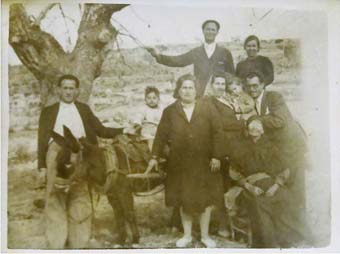
The implementation of the francoist Law of Political Responsibilities was ineffective in the region of Valencia. The volume of possible victims of a reprisal, the inexistent confiscations of property during the War, the inefficiency of the Courts or the law’s defects caused a collapse in the documents processing. Mélanie Ibáñez, researcher at the Universitat de València, has analysed a series of factors that resulted in thousands of people suffering the financial and legal consequences stablished in the law. This is the first work about the implementation of this law in Valencia.
When the Civil War finished, the francoist Law of Political Responsibilities was the start of the economic repression for thousands of citizens. Mélanie Ibañez affirms that the purpose of the law, which was passed on 9th February 1939, ‘was to collect taxes. It was the tool to systematically confiscate belongings in order to pay the debts of the war’. The author highlights that its aim was to ‘deal with the fault’ of all those who had contributed to ‘create’ and ‘keep alive’ the ‘enemies subversion’ by blocking the ‘triumph’ of the so-called ‘National Movement’.
According to the article published in the magazine ‘Historia y Política’, there are several causes for the proceedings accumulation with a very short period of time. In this way, the courts lost a valuable time with mistakes such as the location of those called for trial, the file processing against possible arraigneds that included serious mistakes of personal information or that were impossible to implement since anyone in particular was prosecuted.
For instance, a trial such as the complaint against ‘the Ángeles brothers and the wife of Pérez’, who were supposedly citizens of El Grau in Valencia, was discussed two times as if there was a document with a clear accused. According to the documents, they were listed as ‘unregistered’ neighbours in El Grau and the complaint arrived at the court in 1942 without an accuser. It was also published in the Official Journal. Moreover, there was a petition of documents to the local authorities and the Audiencia Provincial when the Court of First Instance affirmed that the case was unfounded. The Audiencia returned the file and ordered to collect information through the chief judge of Valencia. In October 1943 the judge of first instance sent again the file to Audiencia because there were no more data and the case was not dismissed until October 1945.
‘The work was too much for the examining courts. The region of Valencia was not an exception, even though in this case there were factors such as the previous inexistence of confiscation of property, the late occupation and the volume of the post-war period repression that aggravated the situation’, says Mélanie Ibáñez.
According to the Official Journal of the Valencia Region, between 1939 and 1945 it was opened a file to almost 13.000 people for political responsibilities. The article studies the first period of the law in which slightly less than the half of those files started in the special courts.
There were people in situation of extreme poverty who were previously condemned by the military justice among the affected ones. Spouses that were victims of a reprisal in both cases; widows or wives of fugitive or missing prisoners. These people were the target of a prosecution for political responsibilities that entailed the marginalization since its purpose was to intimidate. Moreover, the periods that cannot be extended were not met. This make longer the anxiety due to the prosecution and the pressure on the family.
Motives for the prosecution
The causes that could lead to prosecution for political responsibility were seventeen. To have been condemned by the military jurisdiction for any of the rebellion crimes, to actively oppose the National Movement, or to have carried out acts aimed at effectively promoting "the anarchic situation in which Spain was", among others. This put all the leaders or affiliates to parties, associations, high officials, candidates, or attorneys of the 1936 elections, among others in the crosshairs.
Furthermore, according to Mélanie Ibáñez, the francoist Law of Political Responsibilities violated legal principles such as the punishment of crimes that were not considered as such at the time they occurred or the double conviction for the same facts when they had already been tried in Council of War. Files were also opened and continued against deceased persons (shot), as foreseen in the law itself.
Research
The research of Melánie Ibáñez is included in the project HAR 2014-57392: Transiciones, movimientos sociales y democracia en el siglo XX. España en perspectiva comparada. (HAR 2014-57392: Transitions, social movements and democracy in the 20th century. Spain from a comparative perspective). It is funded by the Ministry of Economy and Competitiveness and by the FEDER funds. It is included in her PhD thesis ‘Dictadura franquista y represión femenina: la aplicación de la Ley de Responsabilidades Políticas sobre las mujeres en Valencia (1939-c.1948)’, which was defended on 3rd July 2017.
Article:
Mélanie Ibáñez: «La montaña acumulada. La jurisdicción de responsabilidades políticas en Valencia hasta la reforma de 1942». Historia y Política. ISSN-L: 1575-0361, núm. 36, Madrid, julio-diciembre (2016), págs. 289-312
http://dx.doi.org/10.18042/hp.36.12
Last update: 12 de september de 2017 14:16.
News release


















